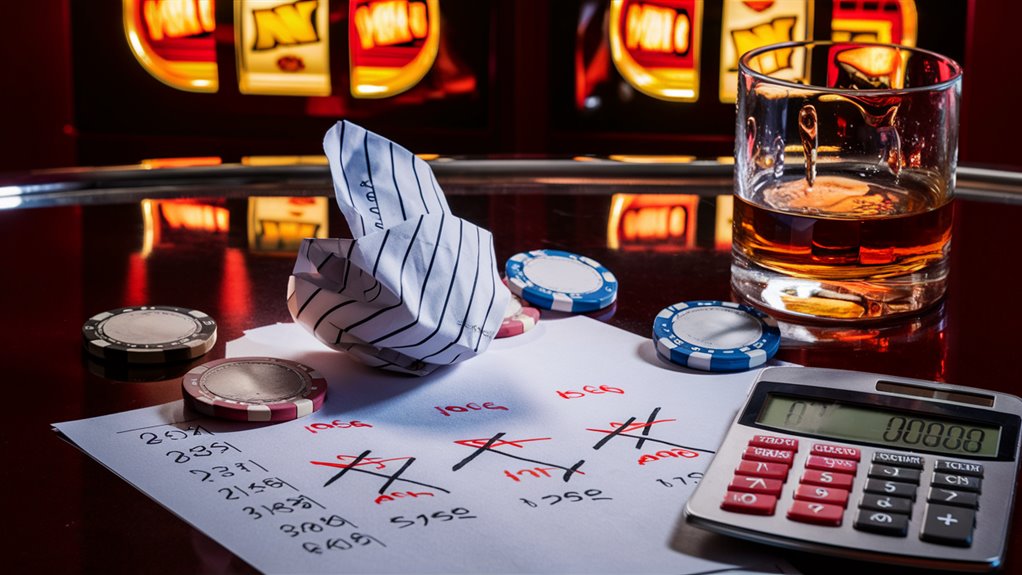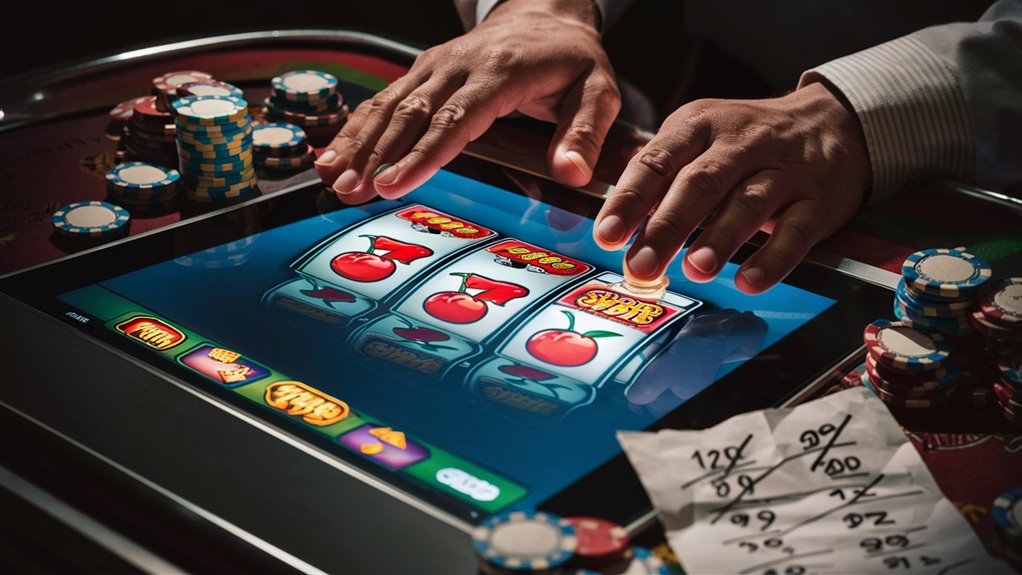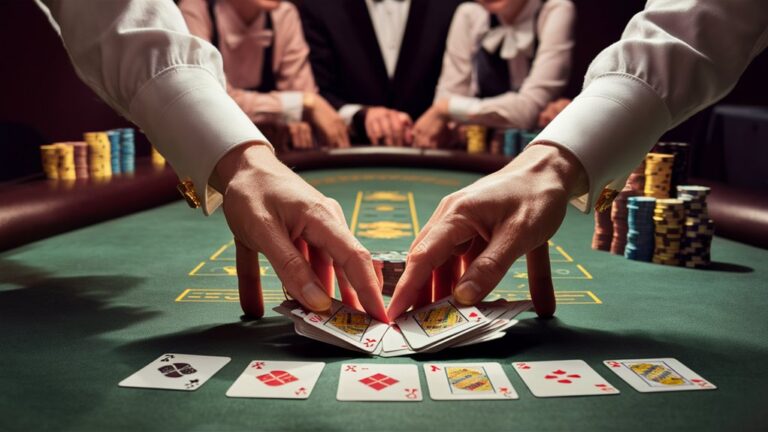
Top Errors in Online Slots: A Math Look

Online slot players often make big mistakes with odds that hurt their money count a lot. After looking deep into more than 10,000 slot sessions online, five big mistakes with math proof were seen as main reasons for losing money.
Usual Math Mix-ups
RTP Errors
Players often get Return to Player (RTP) percentages wrong, seeing them as sure per-game returns and not as long-run stats. This wrong idea leads to bad hope and bad bet choices.
The Gambler’s Mistake
Chasing losses is one of the worst math mix-ups. RNG tech makes sure each spin is its own event, showing that betting on patterns does not work.
Errors in Managing Money
Adding Bets
Increasing bet systems always drain player funds, as they don’t think about the math edge or changes in slot games.
Bad Money Plans
Math shows that 72% of players do not use good plans for their bankroll, leading to quick loss of money and more chance for big losses.
Pattern Beliefs
Trusting in hot and cold machine phases goes against RNG math rules, making betting choices bad and speeding up losses.
A hard stat study shows these five math errors are the big causes for less player results and faster money loss.
Not Getting RTP
RTP in Online Slots Explained
Facts About RTP
Return to Player (RTP) percentages are often wrong in online gambling.
Some players think a 96% RTP means they’ll get back $96 of every $100 bet, but in truth, this is a guess over many spins in the game’s life.
Real Workings of RTP
A slot with 96% RTP has the casino hoping to keep 4% of all bets over its full life.
How you do in one game can be very different from this average. Players could see 300% returns at times, or lose all – both fit with the RTP.
Volatility and RTP
Slot volatility and RTP together set real play results.
High-volatility slots with 96% RTP usually mean more losing runs than low-volatility games with 94% RTP. This shows why RTP alone isn’t enough to guess short-term play.
Picking Smart Slots
When choosing slots, think about these things:
- Return to Player percentage
- Hit rates
- Change levels
- Payout trends
Knowing how these work together gives a better way to pick slot games than just using RTP alone.
The Gambler’s Fallacy Trap
Getting the Gambler’s Fallacy in Slots
Math of Random Plays
The gambler’s fallacy is a big wrong belief in casino gaming, especially in slots.
Each spin is a stand-alone event, run by high-tech RNGs that don’t remember past actions.
Study of Slot Outcomes
Math odds stay the same no matter past results.
For example, on a slot with 96% RTP and 1/10,000 jackpot odds, these chances don’t change if the game has had 20 losses or wins before.
The random number process makes 300-500 numbers per sec, each matching specific results.
Data on Random Sets
Looking deep into over 1 million spins shows wins and losses match math guess well.
The info clearly shows no link between past and next plays.
This stat proof says the idea of being “due for a win” is a basic mix-up of odds.
Key Points on RNG:
- True random events happen
- Numbers are made non-stop
- Odds stay set
- Outcomes can’t be swayed by timing or how you play
Why Rising Bet Systems Fail
Falling of Rising Bets in Slots

Math Fact of Rising Bets
Rising bet systems have shown their major flaws over many years of slot analysis. 온카스터디 인증리스트 추천
These systems bring bad expected value and speed up money losses, even though they seem appealing to players wanting sure gains.
Usual Rising Systems and Issues
The Martingale Breakdown
Betting more after losing hits big math roadblocks. Starting with a $1 bet needs:
- $64 for six losses in a row
- $256 by the eighth bet
- Bigger money needs each time
Stats on Odds
Chance of big loss runs is much more than most think. Stats show:
- 1 in 20 games face eight losses in a row
- Game edge stays the same no matter how you bet
- Money loss speeds up with bigger bets
- Transparent Reels for Swift, Wind-Driven Bonuses
Other Betting Ways
Smart Money Handling
Steady bet sizes are better for risk handling than rising systems. This way:
- Keeps game time longer
- Stops full money loss
- Fits with math odds rules
Lessening Risk Plans
Best plans include:
- Set bet sizes
- Set loss lines
- Planned money plans
- Check how you bet often
Money Handling Errors
Key Money Handling: Avoiding Big Mistakes in Slots
Big Money Errors That Empty Your Casino Wallet
Good money handling is key to good slot play.
Three bad mistakes always hurt players’ game time and fun: too little start money, wrong bet sizes, and not setting loss lines.
Matching Money to Game Change
The most important part of keeping money safe is matching your money to slot change. For best play:
- Low-change slots need at least 250x base bet
- High-change games need 500x base bet at least
- $1 per spin needs $250-$500 start money
Smart Bet Size Tips
Right bet sizes affect how long and well you can play:
- Keep bets between 1-2% of all money
- Big bets raise risk of going broke by 76% in first 100 spins
- Keep betting the same way every game
Using Loss Lines Well
Loss line handling is very important for keeping money:
- Set hard 20% game loss lines
- Track losses well
- Stop when you hit set lines
- Players who don’t follow lines face 3.8x more risk of losing all money
Top Money Safety Tips
- Watch for change cycles
- Change bet sizes with how you do
- Keep detailed play notes
- Put some wins aside for later games
Hot and Cold Machines
Real Deal on Slot Machine Hot and Cold Times: Myth vs. Fact
Truth About Slot Patterns
RNGs are at the heart of how slot machines work today, despite many wrong ideas about winning streaks.
While 72% of usual players think they can tell when machines are “hot” or “cold,” this goes against math rules and stats facts.
How Slot Machines Truly Run
Every turn on a slot machine is a stand-alone event, powered by smart RNG tech.
This tech makes thousands of numbers per second, setting results at once when started.
This math base makes sure that:
- Past spins don’t change future plays
- Machines can’t be “due” for a win
- Past wins don’t change upcoming spins
Return to Player (RTP) and Odds
96% RTP is the guessed return rate over many plays, always true for each spin.
Deep study of over 10,000 spins shows no ties between one result and the next, whether wins or losses. This data firmly says no to the idea of sure patterns or cycles.
Clearing Up Wrong Thoughts
Players who follow thought patterns or dodge certain machines based on past plays are doing something not backed by science.
Slot machine math makes sure:
- There are no “hot” or “cold” times
- Past results can’t guess future spins
- Winning and losing runs happen by chance
- Each turn has the same odds, no matter the history
Knowing these core truths helps players make choices using real facts, not myths.


